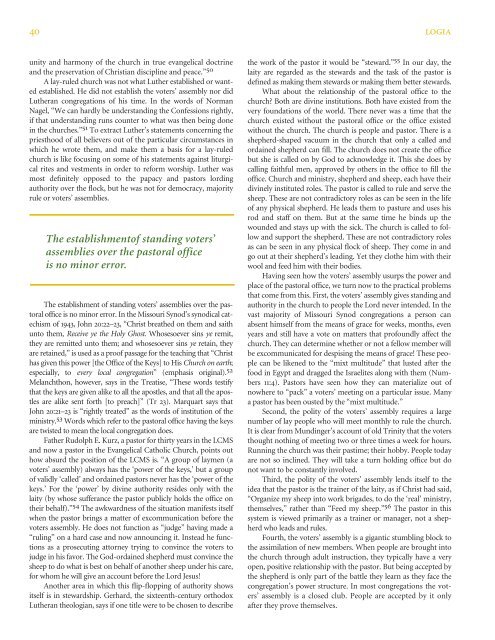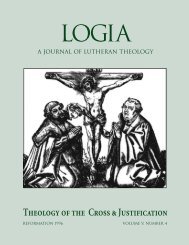03-1 Pastoral Care.pdf
03-1 Pastoral Care.pdf
03-1 Pastoral Care.pdf
- No tags were found...
Create successful ePaper yourself
Turn your PDF publications into a flip-book with our unique Google optimized e-Paper software.
40 LOGIAunity and harmony of the church in true evangelical doctrineand the preservation of Christian discipline and peace.” 50A lay-ruled church was not what Luther established or wantedestablished. He did not establish the voters’ assembly nor didLutheran congregations of his time. In the words of NormanNagel, “We can hardly be understanding the Confessions rightly,if that understanding runs counter to what was then being donein the churches.” 51 To extract Luther’s statements concerning thepriesthood of all believers out of the particular circumstances inwhich he wrote them, and make them a basis for a lay-ruledchurch is like focusing on some of his statements against liturgicalrites and vestments in order to reform worship. Luther wasmost definitely opposed to the papacy and pastors lordingauthority over the flock, but he was not for democracy, majorityrule or voters’ assemblies.The establishmentof standing voters’assemblies over the pastoral officeis no minor error.The establishment of standing voters’ assemblies over the pastoraloffice is no minor error. In the Missouri Synod’s synodical catechismof 1943, John 20:22–23, “Christ breathed on them and saithunto them, Receive ye the Holy Ghost. Whosesoever sins ye remit,they are remitted unto them; and whosesoever sins ye retain, theyare retained,” is used as a proof passage for the teaching that “Christhas given this power [the Office of the Keys] to His Church on earth;especially, to every local congregation” (emphasis original). 52Melanchthon, however, says in the Treatise, “These words testifythat the keys are given alike to all the apostles, and that all the apostlesare alike sent forth [to preach]” (Tr 23). Marquart says thatJohn 20:21–23 is “rightly treated” as the words of institution of theministry. 53 Words which refer to the pastoral office having the keysare twisted to mean the local congregation does.Father Rudolph E. Kurz, a pastor for thirty years in the LCMSand now a pastor in the Evangelical Catholic Church, points outhow absurd the position of the LCMS is. “A group of laymen (avoters’ assembly) always has the ‘power of the keys,’ but a groupof validly ‘called’ and ordained pastors never has the ‘power of thekeys.’ For the ‘power’ by divine authority resides only with thelaity (by whose sufferance the pastor publicly holds the office ontheir behalf).” 54 The awkwardness of the situation manifests itselfwhen the pastor brings a matter of excommunication before thevoters assembly. He does not function as “judge” having made a“ruling” on a hard case and now announcing it. Instead he functionsas a prosecuting attorney trying to convince the voters tojudge in his favor. The God-ordained shepherd must convince thesheep to do what is best on behalf of another sheep under his care,for whom he will give an account before the Lord Jesus!Another area in which this flip-flopping of authority showsitself is in stewardship. Gerhard, the sixteenth-century orthodoxLutheran theologian, says if one title were to be chosen to describethe work of the pastor it would be “steward.” 55 In our day, thelaity are regarded as the stewards and the task of the pastor isdefined as making them stewards or making them better stewards.What about the relationship of the pastoral office to thechurch? Both are divine institutions. Both have existed from thevery foundations of the world. There never was a time that thechurch existed without the pastoral office or the office existedwithout the church. The church is people and pastor. There is ashepherd-shaped vacuum in the church that only a called andordained shepherd can fill. The church does not create the officebut she is called on by God to acknowledge it. This she does bycalling faithful men, approved by others in the office to fill theoffice. Church and ministry, shepherd and sheep, each have theirdivinely instituted roles. The pastor is called to rule and serve thesheep. These are not contradictory roles as can be seen in the lifeof any physical shepherd. He leads them to pasture and uses hisrod and staff on them. But at the same time he binds up thewounded and stays up with the sick. The church is called to followand support the shepherd. These are not contradictory rolesas can be seen in any physical flock of sheep. They come in andgo out at their shepherd’s leading. Yet they clothe him with theirwool and feed him with their bodies.Having seen how the voters’ assembly usurps the power andplace of the pastoral office, we turn now to the practical problemsthat come from this. First, the voters’ assembly gives standing andauthority in the church to people the Lord never intended. In thevast majority of Missouri Synod congregations a person canabsent himself from the means of grace for weeks, months, evenyears and still have a vote on matters that profoundly affect thechurch. They can determine whether or not a fellow member willbe excommunicated for despising the means of grace! These peoplecan be likened to the “mixt multitude” that lusted after thefood in Egypt and dragged the Israelites along with them (Numbers11:4). Pastors have seen how they can materialize out ofnowhere to “pack” a voters’ meeting on a particular issue. Manya pastor has been ousted by the “mixt multitude.”Second, the polity of the voters’ assembly requires a largenumber of lay people who will meet monthly to rule the church.It is clear from Mundinger’s account of old Trinity that the votersthought nothing of meeting two or three times a week for hours.Running the church was their pastime; their hobby. People todayare not so inclined. They will take a turn holding office but donot want to be constantly involved.Third, the polity of the voters’ assembly lends itself to theidea that the pastor is the trainer of the laity, as if Christ had said,“Organize my sheep into work brigades, to do the ‘real’ ministry,themselves,” rather than “Feed my sheep.” 56 The pastor in thissystem is viewed primarily as a trainer or manager, not a shepherdwho leads and rules.Fourth, the voters’ assembly is a gigantic stumbling block tothe assimilation of new members. When people are brought intothe church through adult instruction, they typically have a veryopen, positive relationship with the pastor. But being accepted bythe shepherd is only part of the battle they learn as they face thecongregation’s power structure. In most congregations the voters’assembly is a closed club. People are accepted by it onlyafter they prove themselves.
















